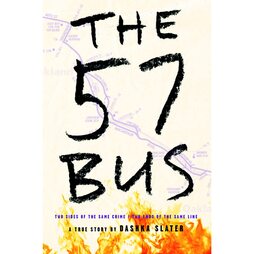Author: Dashka Slater
ISBN: 9780374303259
APA Style Citation
Slater, D. (2017). The 57 bus. New York, NY: Macmillan Publishing.
Buy This Book
https://www.amazon.com/57-Bus-Story-Teenagers-Changed/dp/0374303231
| activity_the_57_bus_.pdf |
Sasha and Richard were teenagers from Oakland, California trying to find themselves in the complicated world of identity, sexuality, friendships, school pressures, and family life. This book is based on interviews conducted by author Dashka Slater with the individuals involved in an event that would change the lives of Sasha and Richard, their families and friends, and random strangers on the 57 bus that day forever.
Sasha was a quirky teenager who loved languages, communism, self-created games, ska-pop-punk bands, and public transport. Sasha was a brilliant academic who attended a small private high school in Oakland. Sasha had recently come out as agender and used the pronouns, they, them, and their. They wore a daily uniform of vest and skirts, bow ties and often top hats, enjoying this gender mash-up. While Sasha's parents worried about whether they would be accepted, Sasha had a tight-knit group of friends at school and excelled in their classes.
Richard attended Oakland High School, which had a diverse population from the many different ethnic neighborhoods in the area. Richard sometimes left school in the middle of the day but maintained a good relationship with the school's truancy officer, Kaprice Wilson. The latter served as a surrogate mother to many of the school's toughest students. Richard asked to be on her caseload and wanted to meet her expectations, and often spent passing periods with other students in her office. Richard's mother was loving but often worked long hours to make ends meet and had not had a chance to finish high school after becoming pregnant at 14. In addition, Richard spent time in a juvenile detention center after he and some of his friends got into a fight on a trip to the beach. Oakland was a dangerous city, and Richard knew many people who were sent to prison or shot due to the violence in the city.
Both Sasha and Richard rode the 57 bus home after school on a regular basis. Even though Sasha had to make two transfers, they did not care because they were fascinated with public transport. Sasha often read or did homework during the trip. One afternoon they had dozed off while reading. Richard and his cousin Jamal were riding the same bus that day. Jamal handed Richard a lighter after noticing Sasha sleeping and commented saying, "Look at this dude." Sasha was in their usual gear with a gauzy skirt, and Richard, as a prank, held the lighter to the bottom of the skirt. Much to his surprise, the skirt ignited and burst into flames. Richard and Jamal jumped from the bus at the next stop, and some other riders were able to extinguish the flames, but Sasha's legs were badly burned. They had to spend weeks in a burn unit, enduring multiple painful surgeries to graft skin back onto their injured legs.
In his interview with police Richard, stated, "I wouldn't say that I hate gay people, but I am very homophobic." With that statement, Richard was charged with a hate crime and charged as an adult. There was an outpouring of support for Sasha at her school and in the community, and those who were close to Richard were confused as this did not seem to be the actions of the person they knew. Richard went first to the Alameda County Juvenile Hall and seemed to do well there with a lack of distraction and strict schedules. Richard was a 16- year-old junior in high school but was tried as an adult because of his prior record, the identification of this act as a hate crime, and what some saw as a lack of remorse. Richard had written a letter of apology to Sasha and her parents, but they did not receive the letter until years later because of ongoing litigation with the case. Many also believe that race played a role in the harsh sentence applied to Richard's crime. Each year 250,000 juveniles are tried as adults and lose the privilege of anonymity or the ability to serve their time in a juvenile detention center. Despite Sasha's parents' plea to treat Richard as a minor, they were unsuccessful. However, they did reach out to Richard's mother, who they knew was struggling just as they were.
Eventually, Sasha was back in school and thriving. They were accepted to Massachusetts Institute of Technology (MIT). Richard was ultimately sentenced to five years in state prison. Those who knew Richard contend that this was not a hate crime, but a prank gone horribly wrong. This tragic event speaks not only to the pain and suffering Sasha endured due to the terrible burns on their legs but about the everyday challenges that nonbinary individuals face. It also speaks to the justice system's flaws that send juveniles into adult prisons rather than juvenile detention centers, often creating individuals who come of age not in a place geared toward rehabilitation but towards punishment.
Other Related Resources
Dashka Slater: Author's website
https://www.dashkaslater.com
Transgender Resources GLADD
https://www.glaad.org/transgender/resources
Online transgender support groups
https://www.verywellmind.com/best-online-transgender-support-groups-4800840
The Trevor Project: Organization to support LGBTQ youth
https://www.thetrevorproject.org
Live Out Loud: LGBT Youth Organizations
https://www.liveoutloud.info/resources/lgbt-youth-organizations/
IGLYO: Creating LGBTQ youth advocates
https://www.liveoutloud.info/resources/lgbt-youth-organizations/
ACLU Factsheet on minors in the legal system
https://www.verywellmind.com/best-online-transgender-support-groups-4800840
The Juvenile Justice System
https://www.nap.edu/read/9747/chapter/7
Psychological Concepts and Figures
Agender
Cisgender
Discrimination
Gender fluid
Stereotyping
Transgender

 RSS Feed
RSS Feed